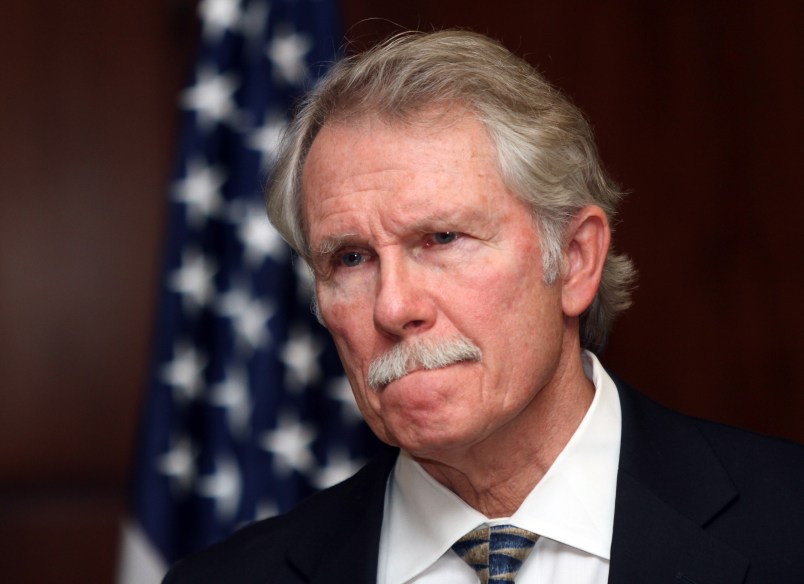SALEM, Ore. (AP) — Facing the biggest crisis of his decades-long political career, Gov. John Kitzhaber finds himself increasingly isolated.
Few of Kitzhaber’s fellow Democrats are sticking up for him as he confronts a barrage of criticism, calls for his resignation and, potentially, a recall petition.
After simmering for months, influence-peddling allegations boiled over on Kitzhaber last week, when an editorial by the Oregonian newspaper calling for his resignation shined a national spotlight on the controversy. On Friday, another newspaper, the Yamhill Valley News-Register in McMinnville, followed suit, saying Kitzhaber has “ardently resisted coming straight.”
“While you have enjoyed many successes, your once-admirable legacy has become soiled by your refusal to recognize and rectify wrong turns,” the newspaper’s editorial team wrote in a letter to Kitzhaber.
Unlike the Oregonian, which endorsed Kitzhaber’s re-election bid last year, the McMinnville paper had endorsed Kitzhaber’s Republican rival, Dennis Richardson.
A series of newspaper reports since October have revealed that Kitzhaber’s fiancée, Cylvia Hayes, did paid consulting work for organizations with an interest in Oregon public policy. During the same period, she worked as an unpaid adviser in the governor’s office on some of the same issues. Kitzhaber has said repeatedly that he and Hayes took care to avoid conflicts, and a state ethics commission will decide whether conflict-of-interest laws were broken.
Kitzhaber’s troubles overshadowed the first week of the legislative session as Democrats moved aggressively to advance some of their top priorities, including a measure to reduce greenhouse-gas emissions that Kitzhaber and Hayes strongly support.
In response to questions about the growing controversy surrounding Kitzhaber, legislative leaders demurred.
“This session is off to a productive start,” House Speaker Tina Kotek, D-Portland, said in a statement. “As the Oregon Government Ethics Commission does its job, we must remain focused on our job as legislators, which is to serve Oregonians by advancing policies that improve people’s lives and strengthen our state.”
Senate President Peter Courtney, D-Salem, offered his compassion, but he also said he’s focused on his own job. Spokespeople for Courtney and Kotek declined to say whether the leaders believed Kitzhaber could effectively govern after the Oregonian editorial said he could not do so.
Attorney General Ellen Rosenblum, a Democrat, called the allegations “very serious” and “troubling” and said she’s exploring her legal options. A spokesman for Secretary of State Kate Brown, also a Democrat, declined to make her available for an interview.
Kitzhaber did get praise from one former rival, former Secretary of State Bill Bradbury, a Democrat who lost to Kitzhaber in the 2010 primary for governor. Bradbury told The Associated Press that the controversy has been “really quite overblown.”
“He’s going to be able to move forward effectively, and it’s just going to take a while to get over these humps,” Bradbury said. “He’s a hell of a good governor, and he’s going to continue to perform.”
Meanwhile, newly released public records revealed more details about Hayes’ work advocating a client’s agenda. Emails released to the Oregonian by the Department of Administrative Services showed she instructed state officials to help implement a policy known as the genuine progress indicator, which she was being paid to promote.
The genuine progress indicator is an alternative to the gross domestic product, which uses health and environmental data to help measure economic success. Hayes was paid by Demos, a New York-based nonprofit, to promote the policy.
The emails show Hayes orchestrated an effort aimed at implementing the genuine progress indicator into the state budget, according to The Oregonian. When Michael Jordan, the state’s chief operating officer, said he couldn’t attend a meeting on the issue at the governor’s mansion, Hayes replied: “Not good. We went forward with this date because you had committed to attending.”
The records also show that Kitzhaber himself intervened to urge Jordan to hire a former Maryland official who worked on the genuine progress indicator in that state, the newspaper reported. He was eventually hired on a yearlong contract worth about $65,000.
Demos distanced itself from Hayes.
“Although we were assured that the contract was reviewed by Oregon counsel, we now know that we should not have trusted Ms. Hayes to carefully monitor the balance between her public and private roles,” Demos’ spokeswoman, Elextra Gray, said in a statement to the Oregonian.
Copyright 2015 The Associated Press. All rights reserved. This material may not be published, broadcast, rewritten or redistributed.







Democrats can be such cowards sometimes. All the governor has to do is have his fiancé resign from being a consultant and anything else that is a conflict. DUH!
Sauce for the goose.
The GOP would defend the governor in similar circumstance–they’d accuse people of “playing politics,” condemn the media for its ‘half-truths,’ declare that he/she was unaware of any impropriety, and eventually it would go away.
Democrats start screaming and rushing for the exits.
Isn’t the Wisconsin Mouth Breather under federal investigation? He is their golden boy du jour in the race for the GOP presidential nomination.
Or to put it another way. Republicans are either corrupt or willing to look the other way when their members are corrupt (same thing) and Democrats won’t tolerate corruption and they aren’t hypocrites when one of their own is corrupt.
I see it as a strength.
I guess I am thinking more of David “Diaper” Vitter staying in the Senate and now probably being the next Governor of LA, while Anthony Weiner took legal, albeit really creepy and bizarre photos of his underwear, and he is forced to resign in disgrace.
I don’t like the double standard. The old IOKIYAR meme is very true. And the media equates those types of scandals when there is very little real comparison. I think the family values GOPers are as rotten as they come because they hide behind the Bible and if caught they invent some redemption story. Their troops circle the wagons around them.
But such is the world in which we live I guess–the world of false equivalence and corporate media.